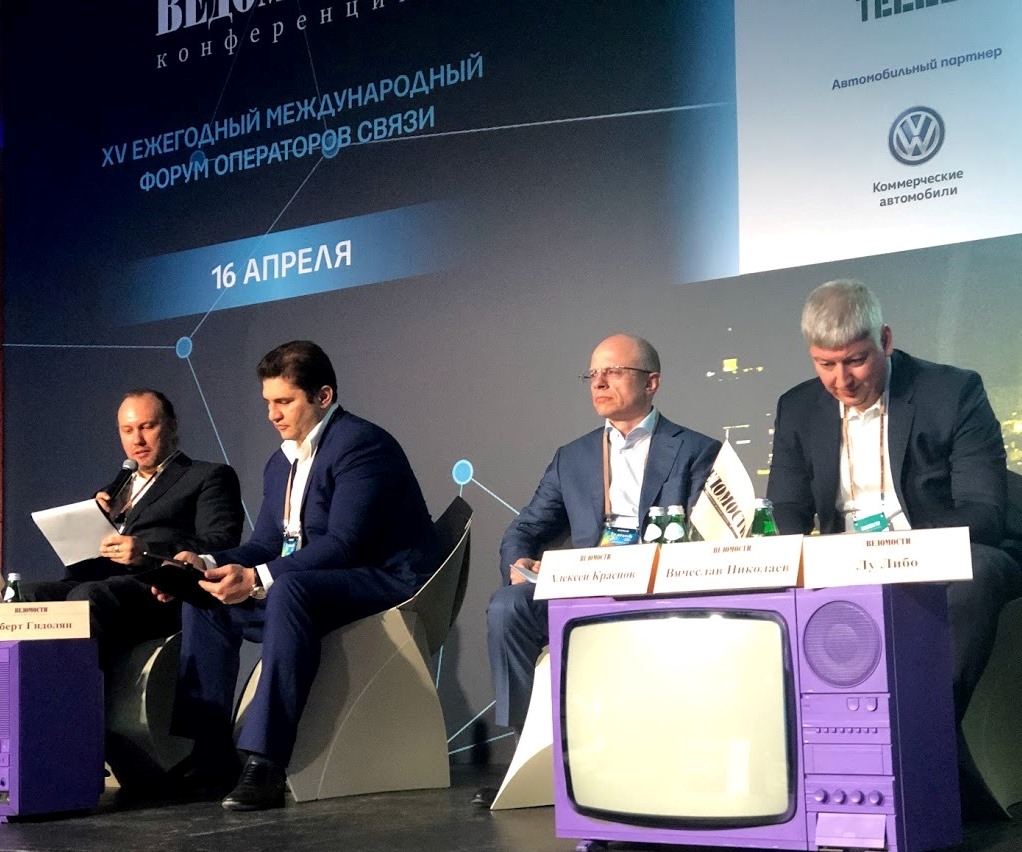The XV international forum for telecommunications operators “Telecom 2019: Expanding Borders into the Digital Future”, organized by Russia’s Vedomosti newspaper, was held in Moscow on April 16.
Deputy CEO of Gazprom-Media Holding, Alexey Krasnov, took part in a discussion called “Transition to digital. New television format” and shared his views on the development of new broadcasting environments and video content distribution using as examples the projects carried out by the Holding.
The session was moderated by Konstantin Ankilov, managing partner of TMT Consulting. Other panel participants included Robert Gndolyan, CEO of Digital Television Russia, Lu Libo, technology director at Huawei Eurasia, Vyacheslav Nikolaev, vice-president of Marketing at MTS, Yuri Pripachkin, president of Russia’s Cable Television Association, Andrey Semerikov, deputy chairman of the ER-Telecom Holding’s Board of Directors, Oleg Tumanov, founder and CEO of Ivi.ru, George Held, vice-president of digital and new business development at VimpelCom, and Alexey Yanchishin, deputy general manager for strategy and investment at National Media Group.
The panel’s participants discussed the future of broadcast and paid television, production of domestic content and importance of a joint industry initiative to combat media piracy, as well as the development of personalized TV, the use of big data and advisory services.
Alexey Krasnov began his presentation with the statement that television still remains the media platform with the largest coverage - 98.9% of the Russian population. Television is also the absolute leader in terms of the media consumers’ time. An average person in Russia spends almost four hours a day in front of a TV screen.
“Gazprom-Media has developed a huge number of formats and technologies for the production and delivery of content on the market over the past 20 years. We now produce 22,000 hours of our own content each year and all of it is in demand,” said Alexey Krasnov.
In regards to the prospects of traditional television and other media platforms in delivering content, Alexey Krasnov emphasized that the Internet is both a major challenge and an opportunity for media companies to increase the consumption of produced content.
“Holdings with their own content are in a better position because they can monetize their own content on television, online, as well as other platforms. In 2018, we tried to show adapted versions of our television products also in movie theaters, as was the case with the Gogol project. The results exceeded all our expectations,” said Aleksey Krasnov.
In his introduction, Aleksey Krasnov gave special attention to the new ways of monetizing video content online, in particular through Big TV Rating. The project measures the consumption of media content both on air as well as online. In this way, a new category of viewers is added to the traditional television audience. Some of the particularly successful projects get an additional 30% added to their TV rating after their online indicators are taken into account.
Gazprom-Media Holding is successfully developing its own video services and monetizing them using a paid model. The TNT-PREMIER platform is among these success cases. It was launched a little less than a year ago, but already has more than 600,000 subscribers and has received 120 million views. Premier content that has yet to air on television accounts for 58% of the views on TNT-PREMIER.
“For the Holding, it is logical to move towards new media environments, including its own video platforms. For us, a variety of formats for viewing content online has long been an extension of television,” Krasnov stressed.

